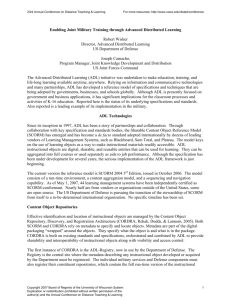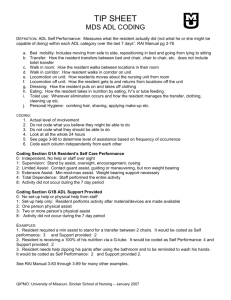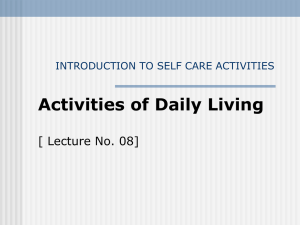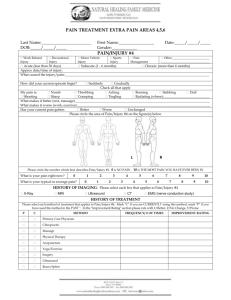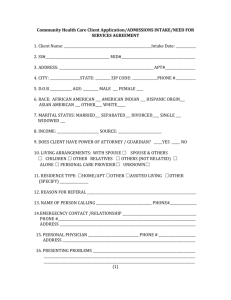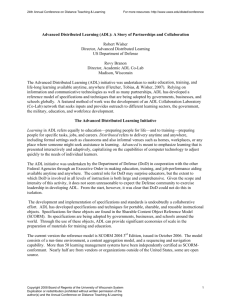ADVANCED DISTRIBUTED LEARNING (ADL) PAST, PRESENT
advertisement
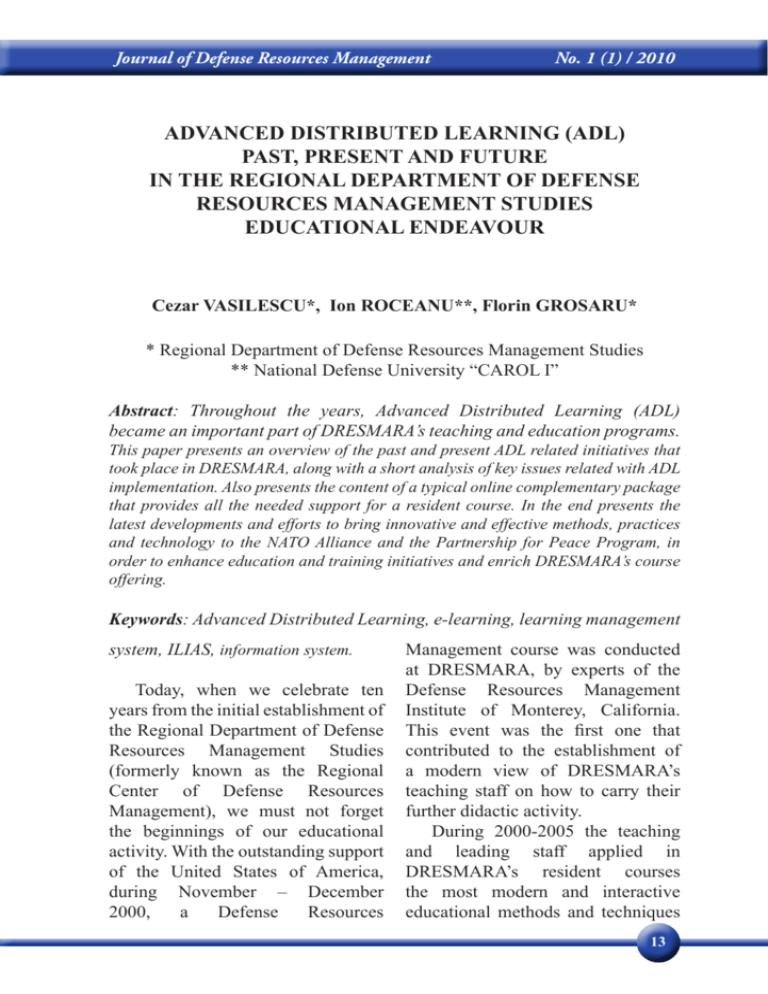
Journal of Defense Resources Management No. 1 (1) / 2010 ADVANCED DISTRIBUTED LEARNING (ADL) PAST, PRESENT AND FUTURE IN THE REGIONAL DEPARTMENT OF DEFENSE RESOURCES MANAGEMENT STUDIES EDUCATIONAL ENDEAVOUR Cezar VASILESCU*, Ion ROCEANU**, Florin GROSARU* * Regional Department of Defense Resources Management Studies ** National Defense University “CAROL I” Abstract: Throughout the years, Advanced Distributed Learning (ADL) became an important part of DRESMARA’s teaching and education programs. This paper presents an overview of the past and present ADL related initiatives that took place in DRESMARA, along with a short analysis of key issues related with ADL implementation. Also presents the content of a typical online complementary package that provides all the needed support for a resident course. In the end presents the latest developments and efforts to bring innovative and effective methods, practices and technology to the NATO Alliance and the Partnership for Peace Program, in order to enhance education and training initiatives and enrich DRESMARA’s course offering. Keywords: Advanced Distributed Learning, e-learning, learning management system, ILIAS, information system. Today, when we celebrate ten years from the initial establishment of the Regional Department of Defense Resources Management Studies (formerly known as the Regional Center of Defense Resources Management), we must not forget the beginnings of our educational activity. With the outstanding support of the United States of America, during November – December 2000, a Defense Resources Management course was conducted at DRESMARA, by experts of the Defense Resources Management Institute of Monterey, California. This event was the first one that contributed to the establishment of a modern view of DRESMARA’s teaching staff on how to carry their further didactic activity. During 2000-2005 the teaching and leading staff applied in DRESMARA’s resident courses the most modern and interactive educational methods and techniques 13 ADVANCED DISTRIBUTED LEARNING (ADL) PAST, PRESENT AND FUTURE IN DRESMARA EDUCATIONAL ENDEAVOUR which they got in contact during the specialization courses attended abroad, as part of their personal development. They also start thinking on the advantages of one method highly used by the military educational institutions attended by our staff - the Advanced Distributed Learning (ADL). Even if “Good teaching is good teaching, no matter how it’s done”, the Advanced Distributed Learning or e-Learning brings with it new dimensions in education. The first DRESMARA’s ADL related initiative took place in 2004, when a “Partnership for Learning Pilot Program (PLPP)” was organized and conducted in collaboration with the Canadian Forces Language School, with the support of the Romanian Human Resources Management Directorate. The activity consisted from an online English Language Course using videoconferencing, held between 18 October - 12 November 2004 and part of the Military Assistance Training Program (MTAP). The parties involved were two Canadian instructors, the participants to the second and third series of DRESMARA’s resident English Language Course on Management and NATO Terminology, DRESMARA’s English teaching staff, along with the IT compartment’s personnel. The activity was highly appreciated by the course participants. All of them stated that the online course was a great addition 14 to the resident one, demonstrating the power of this newly type of education for enhancing participants’ knowledge. In 2006, having in mind that the Regional Department of Defense Resources Management Studies technical infrastructure was designed to facilitate the implementation of ADL support to resident courses, DRESMARA’s leadership decided to investigate the possibility of adding e-Learning technology to its educational capabilities and services. As a consequence, the personnel of the Information Technology compartment and not only started to seek best ways to get things done. We studied some key issues related with ADL implementation, such as: • fundamental theories and concepts: distance learning, advanced distributed learning, on-line learning, web based training; • teaching and learning processes based on information technology, including: instructional design, digital content development, pedagogical aspects, adult education Journal of Defense Resources Management learning; • e-Learning systems: learning management systems (LMSs), learning content management systems, authoring tools for content development, contents standardization (SCORM); • national educational laws and ADL principles; • best practices and lessons learned in NATO and PfP Consortium, Romanian and foreign military and civilian institutions, private sector. In the process, we based our thinking on our general educational and training objectives, on DRESMARA mission, and the military and civilian educational and training frameworks. Of great support was the previous experience with Blackboard, a commercial LMS, that revealed us the strengths and weaknesses of using ADL to enhance the traditional educational process. We carefully weight various learning factors to be able to determine which learning components can be blended together to make a learning program more effective. In this respect, the classroom experience is good for the participants, because their motivation increases due to face-to-face interaction between them and the teaching staff as well as the between themselves and the instructors are more responsive to individual concerns or particular questions. A self-paced online approach gives learners the flexibility to learn No. 1 (1) / 2010 anytime and anywhere, and allows them to select learning materials that meets their level of knowledge or interest to perform more effectively in their particular professional activities. On the other hand, a selfpaced online experience could easily become frustrating because Internet connection bandwidth issues restrict the usage of rich presentation options and hamper the interactivity. In the last four years, with the initial support (in terms of technical assistance, instructional design and guidance of using LMS) of the Advanced Distributed Learning Department within the National Defense University “CAROL I”, we developed a complementary online support package for each of the resident courses that are part of DRESMARA’s educational offer. DRESMARA’s distributed network capacity (technical infrastructure) consisting of hardware, software and communications infrastructure, learning management systems, software and content development authoring tools offer us the possibility to deliver both synchronous and asynchronous educational support services. Our current aim is to provide participants a comprehensive online support package in conjunction with resident courses, so they learn not only essential but detailed information. This ensures the possibility to have a greater foundation of knowledge in order to make resident classes more productive and effective. 15 ADVANCED DISTRIBUTED LEARNING (ADL) PAST, PRESENT AND FUTURE IN DRESMARA EDUCATIONAL ENDEAVOUR information in order to successfully complete their resident classes (fig 2). Fig. 1. The ILIAS portal logon screen. The Learning Management System is an open-source named ILIAS, specifically designed to manage digital SCORM conformant courses and “powered” by the Advanced Distributed Learning Department (figure 1). It is an open-source application widely used by various educational institutions, especially in the military field, already tested, working properly and having constant support consisting of version updates. It is important also to mention the big group of users of this application, which is giving the possibility to share the gained information and practical experience. As of today, the Information Technology Compartment and the Faculty members have developed seven complementary online support packages that are constantly updated and developed, to ensure that course participants receive the correct 16 Fig. 2. DRESMARA’s complementary online support packages. The content of an online package provides all the needed support for the resident course and typically contain the following items (the order can vary) (fig. 3): a) Weekly Schedules; b) Course related Resources lectures, presentations, web resources (movies, video clips), glossaries, readings; c) a Discussion Forum - an area to introduce yourself, your organization, and interests regarding the course; also for free discussions and collaborative tasks; d) Weekly Course Critiques; e) an Educational Process Journal of Defense Resources Management Evaluation Questionnaire - the questionnaire is anonymous and aims to identify the graduates’ level of satisfaction regarding the main educational services offered by DRESMARA; the answers are analyzed in order to find solutions to improve the activity; f) Graduation Papers of former participants; g) Graduation Pictures of former participants. Fig. 3. The content of the complementary online package for the resident Postgraduate Course “Defense Resources Management for Senior Officials”. No. 1 (1) / 2010 Through the use of ADL online support package for each of the resident courses, we effectively engage our community members (teaching staff and course participants) during and after classroom courses. The participants are better prepared for the traditional next day’s classroom based classes when they review prereading materials or communicate with course directors via a learning management system ahead of time. During syndicate practical exercises, the work has adapted to use of our LMS utilities to share information and discuss scenarios in innovative ways. Another positive aspect is that we no longer have to burn so many CDs for participants, because after graduation the course content is available anytime and from anywhere via our LMS portal. Participants’ opinions on using the LMS had been positive and Faculty members are considering more and more the ADL activities as important support tools for traditional classroom methods. During the last four years, the PfP Consortium Advanced Distributed Learning Working Group (ADL WG) meetings helped us to keep in touch with the latest developments and efforts to bring innovative and effective methods, practices and technology to the NATO Alliance and the Partnership for Peace Program, in order to enhance education and training initiatives and enrich DRESMARA’s course offering. 17 ADVANCED DISTRIBUTED LEARNING (ADL) PAST, PRESENT AND FUTURE IN DRESMARA EDUCATIONAL ENDEAVOUR After a two year effort, as a tangible result of discussions between members of DRESMARA Information Technology (IT) Office and NATO School ADL Office, held during several PfP ADL WG meetings, we are about to sign a memorandum of Understanding with NATO School from Oberammergau, Germany regarding the use and update of the “Resource Management in NATO” online course. The online course will be codeveloped by both parties and will benefit the Alliance and Partner Nations and support the aims of the NATO School and DRESMARA. The course will start in spring 2011 and will disseminate Defense Resource Management knowledge and experience among interested participants. We are also currently exploring the possibility to create a future 18 virtual environment as a hub for our alumni, teaching / leading staff, and possible emergent community of practice to informally discuss and comment on work during and after their DRESMARA residency. In conclusion, despite the initial little support for this domain from the military educational decision makers, partially generated by issues such as the recognition of e-learning and its credibility as a non traditional way of learning, infrastructure problems, lack of appropriate training personnel, etc. we manage to keep our minds open to new challenges and new ways of doing things. Throughout the years, ADL has become an important part of DRESMARA’s teaching and education programs. In this development process, we found out that lifelong learning objectives can be best achieved when resident courses and online packages are developed to complement each other.
